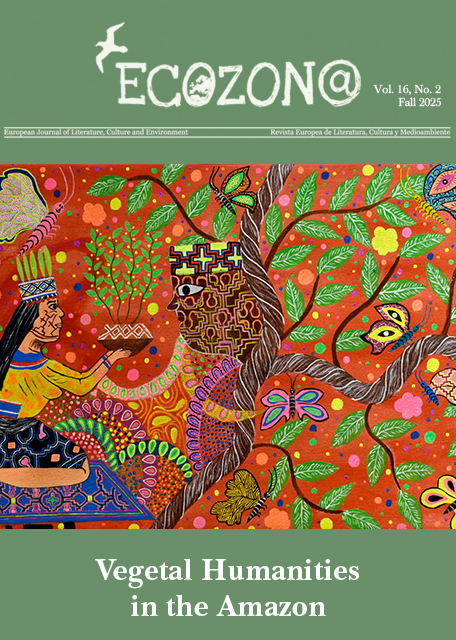Capitalism Clothes it: Toxic Resilience and Undemocratization in the Face of Climate Change
DOI:
https://doi.org/10.37536/ECOZONA.2022.13.1.4375Parole chiave:
Resilience, Toxic resilience, Critique of capitalism, Climate change fiction, Undemocratic practicesAbstract
This paper addresses the mechanisms by which capitalism thrives in the imagined climate crises in the works of Nathaniel Rich’s Odds Against Tomorrow (2013) and Kim Stanley Robinson‘s New York 2140 (2017). More specifically, it approaches resilience as toxic resistance that allows capitalism to survive socio-economic and political forces around it. This article also seeks to uncover the ways in which such resilience deters the acknowledgement of capitalism as an unsustainable, life-threatening system. Furthermore, it scrutinizes the tension between public and private places to reveal capitalism’s undemocratic practices. This analysis first identifies the role of futurology as a technocratic resource in maintaining the capitalist system running for Odds Against Tomorrow as Mitchell’s professionalism is manipulated to perpetuate such a system. On the other hand, I correlate two models of place-connectedness with various economic terms described in New York 2140 to arrive at a hypothesis of how resilience becomes toxic in allowing the habitation of New York despite submerging progressively. The second half of this essay concentrates on public and private places in which Odds Against Tomorrow showcases the vitality of public places as they nurture democratic practices. It also demonstrates two possible courses of action after suffering from a climate crisis: recovery and perpetuation of corporate American habits or their relinquishment accompanied by the embracing of an agrarian lifestyle. Finally, in the case of New York 2140, the interplay between private and public places seek to demonstrate the social injustices brought about by eco-marginalization for which the undemocratic practices of capitalism also surface.
Downloads
##submission.downloads##
Pubblicato
Fascicolo
Sezione
Licenza
Authors who publish with this journal agree to the following terms:
a) Authors retain copyright and grant the journal right of first publication with the work simultaneously licensed under a Creative Commons Attribution License that allows others to share the work with an acknowledgement of the work's authorship and initial publication in this journal (CC BY-NC for articles and CC BY-NC-ND for creative work, unless author requests otherwise.
b) Authors are able to enter into separate, additional contractual arrangements for the non-exclusive distribution of the journal's published version of the work (e.g., post it to an institutional repository or publish it in a book), with an acknowledgement of its initial publication in this journal.
c) Authors are permitted and encouraged to post their work online (e.g., in institutional repositories or on their website) prior to and during the submission process, as it can lead to productive exchanges, as well as earlier and greater citation of published work (See The Effect of Open Access).










